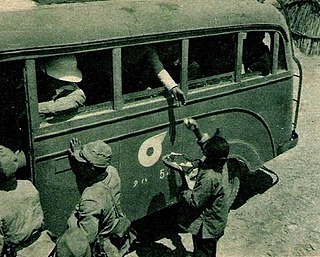North China Transportation Company
| File:Kahokukotsu-logo.png | |
 A bus of the North China Transportation Company | |
Native name | 華北交通株式会社 |
|---|---|
Romanized name | Kahoku Kōtsū Kabushiki Kaisha Huáběi Jiāotōng Zhūshì Huìshè |
| Company type | Kabushiki kaisha |
| Industry | Railway, Transportation |
| Founded | 1938 |
| Defunct | 1945 |
| Headquarters | , |
Area served | east-central China |
| Services | Railway transport, Bus transport |
| Total equity | 50 million yen |
Number of employees | 110,000 |
The North China Transportation Company (華北交通株式会社, Japanese: Kahoku Kōtsū Kabushiki Kaisha, Chinese: Huáběi Jiāotōng Zhūshì Huìshè) was a transportation company in the territory of the collaborationist Provisional Government of the Republic of China during the Japanese occupation. A subsidiary of the South Manchuria Railway with its headquarters in Beijing, it was established in 1938 to manage railways and busses in the area of northern China occupied by Japan during the Sino-Japanese War. It was liquidated in 1945 following Japan's defeat in the Pacific War. It employed 110,000 people, of which 70% were Chinese.
Routes
- Boshan Line (博山線) Zhangdian-Boshan (張店~博山)
- Hongshan Line (黌山線) Zichuan-Hongshan (淄川~黌山)
- Jiaoji Trunk Line (膠済幹線) Qingdao-Jinan (青島~済南)
- Jingbao Trunk Line (京包幹線) Beijing-Baotou (北京~包頭)[1]
- Jinggu Trunk Line (京古幹線) Beijing-Gubeikou(北京~古北口)
- Jinghan Trunk Line (京漢幹線) Beijing-Hankou (北京~漢口)
- Jingshan Line (京山線) Beijing-Shanhaiguan (北京~山海関)
- Jinpu Trunk Line (津浦幹線) Tianjin-Xuzhou (天津~徐州)
- Longhai Trunk Line (隴海幹線) Lianyun-Kaifeng (連雲~開封)
- Shimen Trunk Line (石門幹線) Shimen-Dexian (石門~徳縣)
- Shitai Trunk Line (石太幹線) Shimen-Taiyuan (石門~太原)
- Tongpu Trunk Line (同蒲幹線) Datong-Puzhou (大同~蒲州)
Rolling Stock
Locomotives of the North China Transportation Company used the same classification system used by the South Manchuria Railway between 1938 and 1945.
Locomotives
| Class | Numbers | Original owner | Original class & numbers |
Wheel arr. |
Builder | Total in class |
Year built | Image | Notes |
|---|---|---|---|---|---|---|---|---|---|
| マレイ Marei |
15xx | ? | ? | 0-6-6-0 | North British | 4 | 1908 | ||
| マレニ Mareni |
15xx | ? | ? | 2-4-4-2 | Baldwin | 4 | 1911 | ||
| マレサ Maresa |
15xx | ? | ? | 2-8-8-2 | ALCo | 7 | 1914 | Superheated. | |
| マレシ Mareshi |
15xx | ? | ? | 2-8-8-2 | ALCo | 7 | 1921 | Largest steam locomotives exported from the United States. | |
| ミカイ Mikai |
1501−1520 1521−1769 |
MNR new for NCTC |
ミカナ16718−16736, 16739 -- |
2-8-2 | Kisha Seizō, Nippon Sharyō, Hitachi, Kawasaki, Sifang | 270 | 1938 1939−1945 |
"New National Big Mika" (新國大ミカ). First 20 transferred from Manchukuo National Railway.[1] | |
| ミカコ Mikako |
incl. 1572 | Jichang Railway | ? | 2-8-2 | Kawasaki | ? | 1923−1928 |  |
Transferred from Manchukuo National |
| ミカロ Mikaro |
1501−1505 1506−1620 |
MNR new for NCTC |
ミカロ640–644 -- |
2-8-2 | Kisha Seizō, others | 120 | 1938−1944 | First five transferred from Manchukuo National in 1938. 72 of the 115 new for NCTC were built by Kisha Seizō in 1938-1939 and 1943-1944. | |
| ミカナ Mikana (1) |
15xx | Jingfeng Railway | 201−221? | 2-8-2 | North British, Tangshan Arsenal | 21+ | 1913−1924 |  |
Some also US-built as well.[2] |
| ミカナ Mikana (2) |
158x 15xx |
Jinpu Railway Zhegan Ry |
MK xxx ? |
2-8-2 | ALCo Baldwin |
50 20 |
1918–1937 | [2] | |
| ミカナ Mikana (3) |
15xx | Jingfeng Railway | 301−346 | 2-8-2 | ALCo | 46 | 1922 | [2] | |
| ミカハ Mikaha |
15xx | new for NCTC | -- | 2-8-2 | Škoda | ? | 1939 | [3] | |
| パシロ Pashiro |
1501−1512 1533−1589 |
MNR new for NCTC |
パシロ566–569, 571–578 -- |
2-8-2 | Kawasaki, Nippon Sharyō, Hitachi Kawasaki |
12 57 |
1937 1941–1944 |
Superheated express passenger locomotives. First 12 transferred from Manchukuo National. | |
| パシサ Pashisa |
1501–1520 1521–1550 |
new for NCTC | -- | 2-8-2 | Hitachi Kisha Seizō |
20 30 |
1938 1939−1940 |
"New National Small Pashi" (新國小パシ) | |
| プレロ Purero |
1501−1529~ | ? | ? | 2-6-2T | North British | >29 | 1896 |  |
[4] |

Services

The North China Transportation Company ran a number of long-distance trains, both within China and in conjunction with the South Manchuria Railway and the Chosen Government Railway. Notable trains include the "Tairiku" ("Continental") and "Kōa" limited express trains between Beijing and Busan, Korea. The "Tairiku" entered service in 1938, making the trip from Busan to Beijing in 37.5 hours in 1940; the train was discontinued in 1944. The observation car used on this train is preserved at the Beijing Railway Museum. The "Kōa" was put into operation in 1939, making the same trip in 39.5 hours in 1940, but by 1945 the trip took 49 hours. The "Kōa" was discontinued after the Japanese defeat in the Pacific War.
